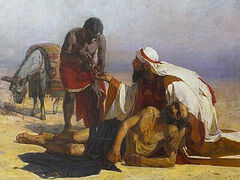St. Gabriel of Imereti was a nineteenth-century Holy Hierarch of the Georgian Orthodox Church. He generously distributed alms to widows, orphans, and all in need; he clothed the naked and buried beggars, having mercy upon the least of the brethren. St. Gabriel was born on November 15, 1825, and reposed in the Lord on January 25, 1896.
Who hasn’t experienced that indescribable sweet inner pleasure that our heart feels when we manage, with God’s aid, to help another get out of grief, gain confidence, and experience joy at least once in his life? Mercy is, generally speaking, inherent to human nature. But from Christians is demanded mercy of a special kind and quality.
The Gospel teaches: Be merciful, like Your Heavenly Father (cf. Lk. 6:36). God is the highest Mercy and Love, therefore, if you want to amend and improve your nature, expel anger and envy from your heart and acquire such love that your very nature might arouse you to show pity and mercy to others. So, if you see a hungry man, don’t satisfy yourself with food until you’ve fed him; if you see a man who has no clothes, practically naked, then you should feel regret and shame that you’re dressed so lavishly while this man doesn’t even have anything with which to cover his nakedness. The mercy of the Heavenly Father is selfless, therefore, emulating Him, you should try to make your mercy the same, without the contamination of any kind of calculation; that is, not because you should show mercy in order to then be praised for it or to receive such kindness in return, but solely out of love, according to the sincere calling of the heart.
Our Heavenly Father is the bearer of the highest reason and wisdom. And therefore, His mercy manifests variously—according to what is most useful for whom. Following this example, you, Christian, should try in every way to show mercy and do good with reason and wisdom. Works of mercy should be beneficial for both sides—both for you and for the one you’re helping. For you, because if you give from a pure heart, you accustom yourself to being virtuous; and for the one you’re helping, only if, according to your reasoned consideration, you give him precisely what he needs at the time. Some people are merciful and have ample material opportunity to provide assistance, but due to inexperience they don’t know how to do it with maximum benefit, which is why the mercy they show turns out to be in vain, and sometimes even worse—it brings trouble and hardship.
Mercy is rendering assistance to our suffering brethren who have little, and it is most pleasing to God. Mercy is the fruit that testifies that a man also possesses the virtues of faith, hope, and love. Our mercy pleases the Savior, but we must try to keep our deeds hidden.
Helping the poor and the suffering is equivalent to serving Christ Himself. Mercy is given as a loan to Christ. Christian mercy is the heartfelt feeling of a kind man awakened and strengthened by faith. If a man’s heart isn’t hardened, if he hasn’t fallen morally, then at the sight of the suffering and destitute, he himself involuntarily begins to grieve; his soul also suffers, and he tries to alleviate the condition of this unfortunate man.
A Christian must be merciful to all, regardless of their religion or nearness to him. There should only be one distinction: First help him who needs it more.
Show mercy selflessly, with a kind heart and feeling, with love for your neighbor and with faith. Many Christians give alms generously, but at the same time, they love for the whole world to know about it, to be praised for their deeds, and to tell the newspapers about them. But such mercy loves its essence, its Christian character.
When you do some kind of good deed, when you offer assistance or mercy, don’t think that the Lord will thank you and repay you with good for good. True, the Lord has mercy upon all for their good deeds, but if you do good and help others with an aim to benefit from it, and not out of love for God and your fellow man, then know that your actions are more like a transaction and your mercy is likened to the mercy of the Catholics and Mohammedans, who count their good deeds like lucre.





